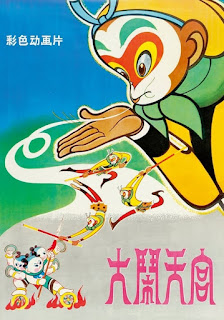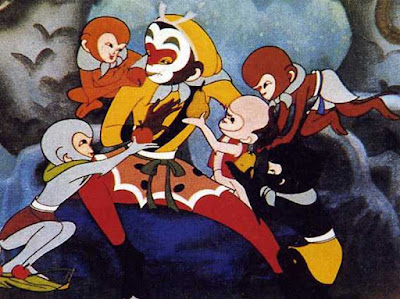If you are a Hong Kong film fan from the West,
you will eventually bump into the Monkey King and the Journey to the West.
And many like me will be confused by it and avoid the whole thing. So I have
skipped by the four Shaw Brothers films that tell part of the story of the
Journey to the West or the Stephen Chow two-fer or the recent ones. There
have been dozens of films going back on the subject plus TV shows. I have
not watched any of them because they felt too steeped in Chinese culture
for me to really understand. But a cartoon? Sure, why not. And I also read
about it on good old Wikipedia which sounded like it knew what it was talking
about.
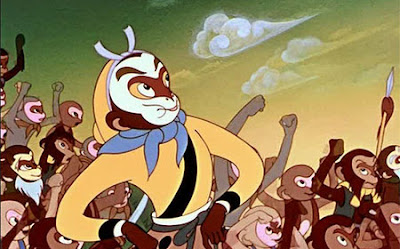
For those who know less than I do - The Journey to the West was a book
written back in the 1500's - even before my time - with the authorship a
bit murky. It is 100 chapters long and is a mix of myth, folklore, fantasy,
religion and historical fact. At a high level it is about a Buddhist monk
named Xuanzang (Tang Sanzang in the novel) who traveled west - in this case
that would be Central Asia and India - along with his four traveling companions
i.e. disciples. He was looking for sacred Buddhist texts/sutras to
bring back to China. Now that is true. But then the author takes a few liberties
and throws in demons, adventures, Gods and creates what is considered one
of China's great literary works. One of those companions was the Monkey King
aka Sun Wukong - one of the more popular characters in the tale. But the
first seven chapters of the book gives the readers an introduction to the
Monkey King that has nothing to do with the Journey. And that is what this
animation relates.
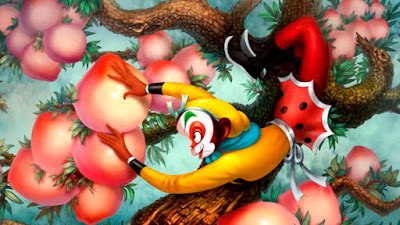
This was made in two parts - the first in 1961, the second in 1964. It seems
that China had a very good animation industry going but the Cultural Revolution
put an end to that. The second part turned out to be the last animation for
years. It is lovely with stunning colors, lovely designs, great imagination,
wonderful Chinese traditional music and a fine story that is actually easy
to follow. My only wish is that the dialogue had been in Chinese Opera form.
A tiny bit is and it worked great. The two parts are about an hour each with
the second part's animation going up a notch.
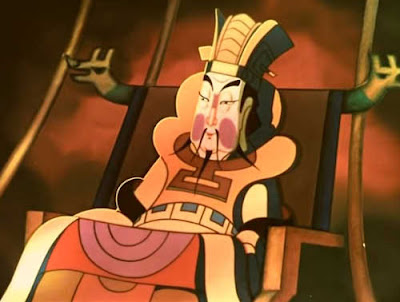
The Monkey King has his little kingdom going - ruling over playful monkeys
and warrior monkeys. Life is good, No threats from anywhere. But in demonstrating
his weapon it breaks and so he goes in search of a more powerful one. He
stops off at the Demon King who tries to pawn off some cheap weapons but
that doesn't work so well. So he cleverly tells Sun Wukong about another
weapon under water that weighs a huge amount and is angered when Sun Wukong
is able to shrink it and take it with him. This is a cudgel that can get
as large or small as the Monkey King wants. I should also mention that the
Monkey King has enormous powers - flying, changing size and shape, transforming
into other animals and enormous strength. Ok - let's make this short. The
Demon King does to the Bog Boss - God - the Jade Emperor who rules heaven
- and complains. The Emperor in order to keep Sun Wukong under control offers
him a job in heaven. Stable Master. He takes it but lets all the horses go
and goes back home.
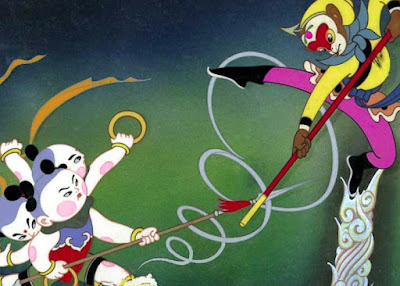
Later after more trouble he is offered yet another job - tending to the peaches
in heaven. But when not invited to the Annual Peach Party he gets pissed
and eats all the peaches. He also wants a title that puts him as an equal
to the Jade Emperor. They send an army after him. In the end of the film
he is back home with his buddies. As far as I can tell, most of it is a fairly
authentic telling of the story - except the ending. In the book, a monk is
able to lock up the Monkey King at the bottom of a mountain for 500 years.
Until Xuanzang comes along and sets him free. Only 93 more chapters to go.
Now maybe I can go watch some of those other films that I have put off for
so long.
